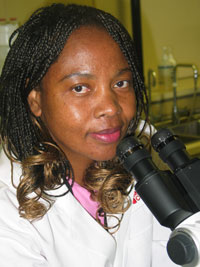 |
Georgette Kanmogne, Ph.D. |
The five-year grant will allow Dr. Kanmogne to focus specifically on understanding how the deadly virus damages the brain’s protective blood brain barrier (BBB) or endothelium, enters the brain and causes dementia. Dr. Kanmonge also will examine how to prevent this from happening.
Dr. Kanmogne’s research has unlocked significant new insights into how HIV-1 damages cells that form the human brain endothelium and enters the brain causing HIV-associated dementia.
In a series of back-to-back studies, her laboratory showed that the proximity of human brain endothelium with HIV-1 or virus-infected macrophages induces a cascade of inflammatory responses. This virus-induced inflammation alters the endothelium structure and function, facilitating entry of the virus and infected cells into the brain.
The research also shows that HIV-1 activates a transcription factor called “STAT1” in cells that form the human endothelium. This activation plays a crucial role in virus-induced inflammation and infiltration of infected cells into the brain.
The associate professor in the department of pharmacology and experimental neurosciences is studying the effects of a drug called “fludarabine,” which has been shown to specifically inhibit STAT1 activation, prevent virus-induced inflammation and diminish infiltration of infected cells through the endothelium.
“Forty million people in the world are currently living with HIV/AIDS,” Dr. Kanmogne said. “Neurological complications are common among HIV-1 infected individuals and despite the beneficial effects of antiretroviral therapy, 76 to 83 percent of autopsy cases show brain involvement with AIDS.”
|
|
“It is my hope that preventing BBB inflammation could provide a unique therapeutic strategy to attenuate HIV-induced BBB injury and improve clinical outcomes in infected individuals,” said Dr. Kanmogne, senior and lead author of the two studies.
These findings were recently published in two journals: the February issue of the prestigious journal Blood, and the April issue of the Journal of Cerebral Blood Flow and Metabolism.
Co-authors included Howard Gendelman, M.D., chairman of the UNMC Department of Pharmacology and Experimental Neuroscience, Yuri Persidksy, M.D., Ph.D., a professor in the departments of pathology and microbiology, and pharmacology and experimental neuroscience, and Fenghai Duan, Ph.D., assistant professor in the department of biostatistics. These discoveries were made possible by the work of Bo Yang, Ph.D., and Anathbandhu Chaudhuri, Ph.D., current and former postdoctoral fellows working in the laboratory of Dr. Kanmogne.
Dr. Kanmogne credits her success to the superb research environment, teamwork and family atmosphere that exists in the department of pharmacology and experimental neuroscience.
“Support from administrative staff is incredible and I am grateful to have had the opportunity to work with people such as Dr. Persidsky, a renowned scientist in the field of blood brain barrier research,” she said.
As she looks forward, Dr. Kanmogne said she wants to pay a special tribute to her department chairman, Dr. Gendelman.
“I am indebted to Dr. Gendelman for the mentorship and support he provides to young scientists such as myself,” Dr. Kanmogne said. “His leadership and vision has been invaluable to the growth and success of the department of pharmacology and experimental neuroscience.”
“We are very proud of the incredible progress made in science and teaching by Georgette. Her works on-site in Africa and on the basic science of the blood brain barrier and its role in human disease are at the cutting edge of research in the field,” Dr. Gendelman said. “She is a role model for all of our junior faculties to follow and as a university we are lucky to have someone of this caliber amongst us.”